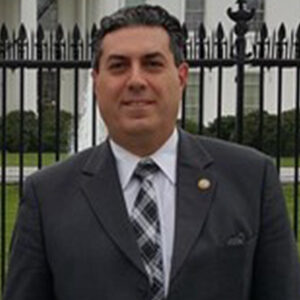IMAGINE.
How will the security industry change, adapt and be disrupted by the year 2040? What will be the factors that drive technological innovation and the use of security devices over the next generation?
SIA’s Security 2040 initiative presents predictions and perspectives on how future security technologies will evolve and be deployed.
Security 2040 aims to inspire the global security industry to think about what could soon be possible through the continued development of security technology. Imagine.
Produced with underwriting support from:

Watch Now: Part 1 of Security 2040
Watch Now: Part 2 of Security 2040
Watch Now: Part 3 of Security 2040
Our Contributors
Sean Ahrens, Project Manager, Affiliated Engineers
Benji Bolick, Senior Digital Communications Specialist, ASSA ABLOY Opening Solutions Americas
Pierre Bourgeix, CEO, ESI Convergent
Richard Brent, CEO, Louroe Electronics
Charles Burns, Vice President of Security, Miami Dolphins
Rich Campbell, Training and Development Specialist, RFI
John Carter, President, CTO and Co-Founder, ReconaSense
Essam Choudhary, CIO, Perimeter Security Solutions, Co-Founder, Security Innovation Hub
Johan Eliasson, Director of Innovation, HID Global
Brian Harrell, Vice President and CSO, AVANGRID, Former Assistant Secretary for Infrastructure Protection, U.S. Department of Homeland Security
Antoinette King, Founder, Credo Cyber Consulting, Director, Regional Sales East/Head of Cyber Convergence, i-PRO Americas
Kabir Maiga, Co-Founder, PassiveBolt
Mike Mathes, President, Global Growth, Convergint Technologies
Fredrik Nilsson, Vice President, Americas, Axis Communications
Pete O’Dell, Founder and CEO, Swan Island Networks
Lee Odess, CEO, Access Control Executive Brief
Chuck Randolph, CSO, Ontic
Dr. Daniel Reichman, CEO, Ai-RGUS
Willem Ryan, Vice President, Marketing and Communications, AlertEnterprise
Isla Schanuel, Project Manager, ZBeta
Steve Surfaro, Chair, SIA Public Safety Interest Group
Pierre Trapanese, CEO, Northland Control Systems
Quang Trinh, Business Development Manager, Platform Technologies, Axis Communications
Steve Van Till, Founder and CEO, Brivo
Justin Wilmas, President, Netwatch North America
Teresa Wu, Vice President, Smart Credentials – Civil Identity, Idemia
Brett Zelnio, Consulting Engineer, ZBeta
Yaron Zussman, General Manager, Magos America, Magos Systems

As security technology advances, those who use it will need more advanced skills and training. Security practitioners of the future will not just check IDs or view surveillance footage. Rather, they could be managing a small tech center from their computer or phone – and have intelligent machines and automated devices as their coworkers.
Future Thinking
I think, for guarding, the concept of going hands-on with people is going to go away. I think officers will have some unique tools to use to prevent going hands-on, but still disable or retain a person I think security leaders will likely be artificial intelligence experts or lawyers I think the reliance on law-enforcement is going to decrease.
–John Maffey, President, M3T Corporation
In addition to being more diverse, the workforce will be primarily composed of millennials, Gen Zs and Gen Alphas, with most of the Xennials and Gen X folks considering retirement, if they have not already retired. That means a completely different set of skillsets and technologies, as well as values and work ethics.
-Rich Campbell, Training and Development Specialist
RFI
Letting humans operate a robot or act based on the sensors on that robot (e.g., video sent back to a command station) puts fewer people in harm’s way and could be an effective means to augment physical guarding and patrolling workforces.
-Daniel Reichman, Ph.D., CEO, Ai-RGUS

From locks that save personnel from the drudgery of guarding a door to cameras that reduce the number of required posts and patrols, technological advances have consistently enabled fewer people to accomplish more tasks. The security solutions of the future could leap forward in labor savings by not just providing information, but also making and executing decisions.
Future Thinking
Autonomous and uncrewed solutions will be instrumental in performing routine security tasks, reducing human error, and enhancing efficiency. However, these technologies will also introduce new vulnerabilities that will need to be addressed, such as potential hacking or technical failures.
-Kabir Maiga, Co-Founder
PassiveBolt
Autonomous and uncrewed solutions will virtually eliminate operational controls. They will also provide a much more detailed view of situational awareness, not just within the same SOC, but across SOCs as part of a subscription service. Security managers and personnel will be able to virtually control autonomous solutions from a central operations center and interact with it using AI and voice controls.
-Rich Campbell, Training and Development Specialist
RFI
The ability to recognize more detailed behaviors can drive down the cost of video monitoring both in terms of false alarms (because the AI will be more accurate by its ability to consider additional context than a video provides) but also in terms of the burden on any individual operator to review AI algorithm detections.
-Daniel Reichman, Ph.D., CEO, Ai-RGUS

It has been a buzzword in the security industry for at least two decades, but, in coming years, true convergence may finally become inevitable. The networking of security devices and the increasing integration of security into other building and city technologies could soon make silos not just inefficient, but impossible.
Future Thinking
Physical and cybersecurity will never reach true singularity. However, the convergence will soon be better described as a critical symbiotic balance. Cybersecurity could not exist without equivalent physical security and vice versa. Any imbalance in a security program’s physical and cybersecurity architecture would eventually be revealed as a primary weakness.
-Brett Zelnio, Consulting Engineer
ZBeta
Hackers will always look for the weakest link and, if that link is the access control or video system, they will exploit it. Every integrator in the market should already be upping their cyber IQ today. In 2023, most can still partner with external companies for that work. However, I think that, by 2040, every system integrator will need to have in-house cyber security experts and offer services in that domain.
-Yaron Zussman, General Manager, Magos America
Magos Systems

Whatever technology is used, the core of security has always been about securing the perimeter and controlling access; conducting surveillance and gathering information; and sounding alarms in case of breaches or emergencies. The equipment that is used for these tasks today will continue to improve and will likely move closer to full integration.
Future Thinking
"By 2040, video surveillance solutions will be completely self-contained on the device, at the edge, with cloud storage and AI and machine learning included in the devices themselves. … Access control solutions will be integrated with the human body. Credentials will be embedded and no longer handed out with little plastic/radio enabled cards. Mobile credentials will be the industry standard, and legacy technologies will be outlawed due to homeland security requirements."
– Rich Campbell, Training and Development Specialist
RFI
"By 2040, we can anticipate technology capable of penetrating walls, zooming incredible distances, and providing real-time behavioral analytics. This technology will have the capability to monitor workplace behavioral patterns akin to the FBI’s profiles of serial killers. Furthermore, it will be deployable in mobile formats and integrated into autonomous devices."
– John Carter, President, CTO and Co-Founder
ReconaSense

While deterrence has long been a goal of security, the field primarily has focused on detecting and responding to threats that are already present – or that have already caused damage and loss. The next generation of security could, for the first time, deploy preventive solutions that enable action before harm occurs.
Future Thinking
By 2040, we can anticipate technology capable of penetrating walls, zooming incredible distances, and providing real-time behavioral analytics. This technology will have the capability to monitor workplace behavioral patterns akin to the FBI’s profiles of serial killers. Furthermore, it will be deployable in mobile formats and integrated into autonomous devices.
–John Carter, President, CTO and Co-Founder, ReconaSense
AI already plays a huge role in the security market today. We are seeing all major manufacturers doing work with AI in access control, video analytics, data analytics, etc. By 2040, AI will be the norm for everything, which I think will allow the security world to become much more proactive as well as data driven. This will allow end users to deploy security in the most efficient way.
-Yaron Zussman, General Manager, Magos America
Magos Systems

From ID cards to passwords to biometrics, one of the key challenges within security is determining how people can prove that they are who they say they are. Technology continues to develop new approaches for accomplishing this with greater degrees of accuracy and assurance, but what does this mean for concepts of privacy?
Future Thinking
"Younger people who grew up on an “app-first” Internet do not value privacy as highly as older generations. … Going forward, not only will it be possible to roll out changes that may have been seen as an invasion of privacy in previous years, but the baseline expectation of privacy from your average person will be lower as well. Flipping this around, however, it is important to keep in mind the psychological consequences of the same. If everyone is used to being filmed all the time, then a security camera is no longer the deterrent it once was."
– Isla Schanuel, ZBeta
"The identity will naturally converge, so that all systems identify the same person across physical and logical systems. For convenience and efficiency-oriented organizations, physical security will be fully integrated with IT and building management systems. For security-oriented organizations, cybersecurity threats will pose limits to the openness and integration of all systems."
– Johan Eliasson, HID Global

While artificial intelligence gets most of the headlines, other technological developments also have the potential to dramatically alter the security industry, along with society, as a whole. At or near the top of the list is quantum computing, which could revolutionize processing, encryption and nearly all other aspects of technology.
Future Thinking
Security will be built into technology inherently from the earliest stages of design. If tech is stolen, it will be easier to trace, thus dropping the black market demand for those particular goods. As more devices become “connected,” there is a greater opportunity for each device to have its own unique identifier.
–Brett Zelnio, Consulting Engineer, ZBeta
Among the key initiatives currently underway that will shape the world of security and every aspect of life by 2040, quantum computing stands out as paramount. … The advancements in AI are already evident in our daily lives. However, when combined with the performance of quantum computing, AI’s reliability and speed will far surpass what we have today.
-John Carter, ReconaSense

Among the debates in the security industry today is, On-Premises vs. Cloud: Which provides more efficiency, security and value? Cloud advocates argue that the direction of technological advancement combined with the ever-growing need for storage and compute mean that on-premises faces a future similar to analog.
Future Thinking
"I think that, by 2040, most video surveillance applications will run in the cloud and will be based on much more intelligent sensors. I think the change we are already seeing will accelerate with smart cameras, and the technology will mature to a point that every organization will be able to afford actionable video versus just recording and passive monitoring."
– Yaron Zussman, General Manager, Magos America
Magos Systems
"Moving forward, we should expect to see an increase in threats which are more subtle and/or that target Internet infrastructure rather than individual websites. For example, attacks targeting service providers (up to, and including, T1) and cloud service “sleeper” attacks, where something installed in a physical location is left in place for an extended period of time before being activated for an attack. “There is no cloud; it’s just someone else’s computer."
– Isla Schanuel, Project Manager
ZBeta

If there is one technology that is regarded as most likely to define security in the next generation, it is artificial intelligence. AI holds the promise of making sense of masses of data that no human could possibly process while potentially empowering machines to make decisions that are now left to people. But what form will AI take? And how much of it is hype?
Future Thinking
The role of AI will be so large that it’s hard to know where to begin. In the present, I would say that any company that is not figuring out how AI will impact their space, and then incorporating it into their products and approach to the market, will be extinct or irrelevant within the next decade.
-Steve Van Till, Founder and CEO
Brivo
We will see that AI will permeate all digital security solutions, from increasing the convenience or efficiency to increasing the security level.
–Johan Eliasson, Director of Innovation, HID Global
With a more efficient AI engine, it will be possible to teach an AI to recognize complicated behaviors and potentially move from recognizing nouns to recognizing verbs. Those verbs could be much vaguer than recognizing a noun. For example, this could include automatically identifying dangerous behaviors.
–Daniel Reichman, Ph.D., CEO, Ai-RGUS

There generally appear to be two schools of thought regarding the impact of technology on security jobs. One argues that AI and automation will dramatically reduce the need for human personnel, while the other asserts that humans will remain an essential component, but they will be doing different jobs requiring different skills, compared to today.
Future Thinking
There will be a reduction of manned guards. First response will be robotic, and any unclear situations will be handled, or augmented by, autonomous remote-controlled devices.
-Johan Eliasson, Director of Innovation
HID Global
We should expect to see a decrease in client willingness to pay for humans within the system. This may manifest as companies and private clients seeking to replace security guards with robots, cameras, etc. But we should also prepare ourselves for the possibility of increased demand for novel solutions and new technologies.
-Isla Schanuel, Project Manager
ZBeta

Security today is often siloed, not only in its technologies, but also in its functions. With greater integration into the Internet of Things and the overall tech ecosystem, however, security in the future could be more frictionless and more convenient as the concepts behind smart buildings expand into smart societies.
Future Thinking
Security will assume a central role in the ecosystem more than ever before. Unchecked technology has the potential to infringe upon many of the freedoms we currently cherish. … Striking a balance in this regard will undoubtedly prove challenging for all of us.
–John Carter, President, CTO and Co-Founder, ReconaSense
At some point, security is going to become completely integrated within information technology. Colleges, universities, and trade schools will be teaching principles of physical security, low voltage, AI, and supporting concepts as a required part of the curriculum. Cybersecurity is already a completely integrated part of the ecosystem, and physical security and associated technologies will be subservient to that.
–Rich Campbell, Training and Development Specialist, RFI



























